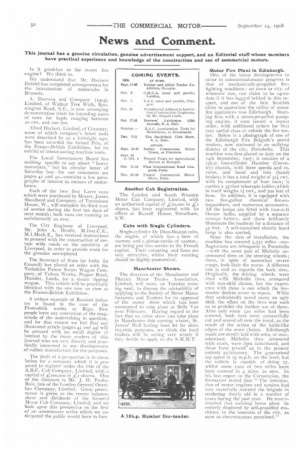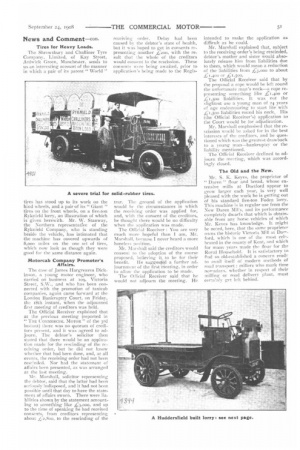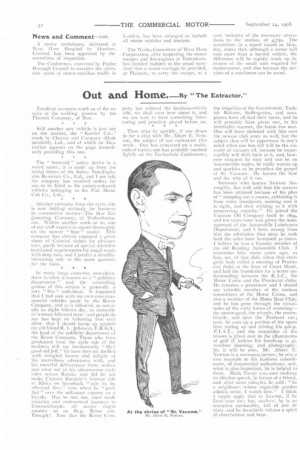News and Comment.
Page 10

Page 11

Page 12

If you've noticed an error in this article please click here to report it so we can fix it.
This journal has a genuine circulation, genuine advertisement support, and an Editorial staff whose members have practical experience and knowledge of the construction and use of commercial motors.
Is it good-bye to the steam fire engine? We think so.
We understand that Mr. Davison Dalziel has completed arrangements for the introduction of motorcabs in Brussels.
A. Darracq and Company (1905), Limited, of Walnut Tree Walk, Kennington Road, S.F.., is now arranging demonstration trials for intending users of vans for loads ranging between 10 cwt. and one ton.
Alfred Herbert, Limited, of Coventry, some of which company's latest tools were described by us a fortnight ago, has been awarded the Grand Prix, at the Franco-British Exhibition, for its exhibit of labour-saving machine tools.
The Local Government Board has nothing specific to say about "heavy motorcars," but its circular letter of Saturday last—for our comments see pages 41 and 42—contains a few paragraphs of interest to owners of motorbuses.
Each of the two first Lacre vans which were purchased by Messrs. James Shoolbred and Company, of Tottenham House, W., will complete its third year of service during the first ten days of next month; both vans are running as satisfactorily as ever.
The City Engineer of Liverpool, Mr. John A. Brodie, M.Inst.C.E., M.I.Mech.E., has received instructions to proceed with the construction of certain wide roads on • the outskirts of Liverpool, in order to provide work for the genuine unemployed.
The Secretary of State for India (in Council) has placed an order with the Yorkshire Patent Steam Wagon Company, of Vulcan Works, Pepper Road, Hunslet, Leeds, for a steam tipping wagon. This vehicle will be practically identical with the one now on view at the Franco-British Exhibition.
A unique example of Russian industry is found in the case of the Prowodnik works at Riga. Few people have any conception of the magnitude of the undertaking in question, and for that reason we feel that our illustrated article (pages 43 and 44) will be perused with no small degree of interest by the many readers of this journal who are very directly and practically interested in any developments of rubber Manufacture for tire purposes.
The draft of a prospectus is in circulation for a company which it is proposed to register under the title of the A.B.C. Cab Company, Limited, with a capital of E,200,000 in Li shares. One of the directors is Mr. J. H. FooksBale, late of the London General Omnibus Company, Limited. Great prominence is given to the recent balancesheet and dividends of the General Motor Cab Company, Limited, and we look upon this prospectus as the first of an unnecessary series which we anticipated the public would have to face. Another Cab Registration.
The London and South Western Motor Cab Company, Limited, with an authorised capital of',2o,000 in 4't shares, has been registered with its offices at Russell House, Streatham, S.W.
Cabs with Single Cylinders.
Single-cylinder De Dion-Bouton cabs, the engine of which has a bore of momm. and a piston-stroke of tzomm., are being put into service in the French capital. Their colouring and lines are very attractive, whilst their running should be highly enonomical.
Manchester Shows.
The directors ofthe Manchester and District Motor Trades Association, Limited, will meet, on Tuesday evening next, to discuss the advisability of applying to the Society of Motor Manufacturers and Traders for its approval of the motor show which has been -announced to take place at Belle Vue next February. Having regard to the fact that no other show can take place in Manchester this coming winter, St. James' Hall having been let for skating-rink purposes, we think the local traders will he acting very wisely if they decide to apply to the S.M.M.T.
Motor Fire Plant in Edinburgh.
One of the latest developments to occur in commercial-motor progress is that of mechanically-propelled fire fighting machines : no town or city, of whatever size, can claim to be up-to date if it has lagged behind in this re spect, and one of the first Scottish cities to appreciate the utility of motot tire appliances was Edinburgh. Start ing first with a steam-propelled pumping engine, it soon issued a repeat order, with additional orders for that very useful class of vehicle the fire tender. Below is a photograph of one of the Edinburgh Fire Brigade's petrol tenders, now stationed in an outlying district of the city, Portobello. This machine was first placed on duty on the 14th September, 1907; it consists of a ish.p. four-cylinder Humber (Coventry) chassis, with three speeds and reverse, and hand and foot (band) brakes; it has a total weight of 324 cwt. with its complement of four men ; it carries a 35-foot telescopic ladder,which in itself weighs ti cwt., and 700 feet of hose. In addition, it is equipped with two five-gallon chemical fire-extinguishers, and numerous accessories. All the lamps are fitted with four-volt Osram bulbs, supplied by a separate storage battery, and these brilliantly illuminate the roadway for a distance of 35 feet. A self-Contained electric hand lamp is also carried.
Since the date of installation, the machine has covered 3,332 miles--conflagrations are infrequent in Portobello —with the same pair of Michelin unarmoured tires on the steering wheels ; these, in spite of somewhat severe usage, look little the worse. A different tale is told as regards the back tires. Originally, the driving wheels were shod with Michelin tires, armo.ured with non-skid chains, but the experience with these is one which the firemaster desires never to repeat. While they undoubtedly saved many an ugly skid, the effect on the tires was such as to prohibit the further use of them. After only some 320 miles had been covered, both tires were unmercifully cut and scored all over the tread, as the result of the action of the knife-like edges of the worn chains. Edinburgh roads are tnostly laid with setts, or macadamised. Michelin tires armoured with studs, were then substituted, and these have proved' up to the present entirely satisfactory. The guaranteed top speed is 25 m.p.h. on the level, but the vehicle is capable of doing 27, whilst some runs of two miles have been covered in 4 mins. zo secs. In his last report to the Corporation, the firemaster stated that " The introduction of motor engines and tenders had very materially assisted the brigade in rendering timely aid in a number of cases during the past year. He recommended that existing horse plant be entirely displaced by self-propelled machines, in the interests of the city, as soon as circumstances permitted." Tires for Heavy Loads.
The Shrewsbury and Challiner Tyre Company, Limited, of Kay Street, Ardwick Green, Manchester, sends to us an interesting account of the manner in which a pair of its patent " World " tires has stood up to its work on the hind wheels, and a pair of its " Giant " tires on the front wheels, on a five-ton Ryknield lorry, an illustration of which is given herewith. Mr. W. Stanwav, the Northern representative of the Ryknield Company, who is standing beside the vehicle, has intimated that the machine has covered upwards of S,000 miles on the one set of tires, which now look as though they were good for the same distance again.
Motorcab Company Promoter's
Affairs.
The case of James Hargreaves Dickinson, a young motor engineer, who carried on business at ton, Victoria Street, S.W., and who has been connected with the promotion of taxicab companies, again came forward at the London Bankruptcy Court, on Friday, the t8th instant, when the adjourned first meeting of creditors was held.
The Official Receiver explained that at the previous meeting (reported in " THE COMMERCIAL MOTOR" Of the 3rd instant) there was no quorum of creditors present, and it was agreed to adjourn. The debtor's solicitor then staled that there would be an application made for the rescinding of the receiving order, but he did not know whether that had been done, and, at all events, the receiving order had not been rescinded. Nor had the statement of affairs been presented, as was arranged at the last meeting.
Mr. Marshall, solicitor representing the debtor, said that the latter had been seriously indisposed, and it had not been possible until that day to have the statement of affairs sworn. There were liabilities shown by the statement amounting to something like £3,000, and up to the time of speaking he had received consents, from creditors representing about ,4:2,Soo, to the rescinding of the
receiving order. Delay had been caused by the debtor's state of health, but it was hoped to get in consents representing another 4'200, with the result that [lie whole of the creditors would consent to the rescission. These consents were being awaited, prior to application 's being made to the Regis trar. The ground of the application would be he circumstances in which the receiving order was applied for, and, with the consent of the creditors, he thought there would be no difficulty when the application was made.
The Official Receiver : You are very much more hopeful than I am, Mr. Marshall, because I never heard a more hopeless position.
Mr. Nlar,hall said the creditors would consent to the adoption of the course proposed, believing it to be for their benefit. He suggested a further adjournment of the first Meeting, in order to allow Illy application to be made.
The Official Receiver said that he would not adjourn the meeting. He intended to make the application as difficult as he could.
Mr. Marshall explained that, subject to the receiving order's being rescinded, debtor's mother and sister would absolutely release him from liabilities due to them, which would mean a reduction of the liabilities from ,,:3,000 to about .4;1,400 or „{:;1,500, The Official Receiver said that by the proposal a rope would be left round the unfortunate inan's neck—a rope representing something like ,,1,400 or 4.1,5oo liabilities. It was not the slightest use a young man of 24 years of age endeavouringto start life with L:1 ,5o0 liabilities round his neck. His (the Official Receiver's) application to the Court would be for adjudication.
Mr. Marshall emphasised that the rescission would be asked for in the best interests of the creditors, and he questioned which was the greatest drawback to a young man—bankruptcy or the liability mentioned.
The Official Receiver declined to adjourn the meeting, which was accordingly closed.
The Old and the New.
Mr. S. K. Keyes, the proprietor of " D-en " flour and bread, whose extensive mills at Dartford appear to grow larger each year, is very well pleased with the work he is getting out of his standard five-ton Foden lorry. This machine is in regular use from the New Daren Mil's, and its performance completely dwarfs that which is obtainable from any horse vehicles of which Mr. Keyes has knowledge. It might be noted, here, that the same proprietor owns the historic Victoria Mill at Dart_ ford, which is one of the most celebrated in the county of Kent, and which for many years made the flour for the Royal Household. It is satisfactory to Fna so old-established a concern ready to avail itself of modern methods of road transport : millers who mark time nowadays, whether in respect of their milling or road delivery plant, must certainly get left behind. A na ct or ambulance, delivered at West I lam Hospital by Humber, Limited, has been approved by the coinmittee of inspection.
The Conference, convened by Poplar Borough Council to consider the excessive speed of motor-omnibus traffic in Ltwidon, has been enlarged to include all motor vehicles and tractors.
The Works Committee of West Ilam Corporation, after inspecting the motor escapes and fire-engines at Tottenham, has decided (subject to the usual sanction) that a motor carriage be provided, at Plaistow, to carry the escape, at a
cost, inclusive of the necessary alterations to the station, of £750. The committee, in a report issued on Monday, states that, although a motor will cast more than a horsed vehicle, the difference will be rapidly made up by reason of the small sum required for maintenance, and also because the services of a coachman can be saved.




















